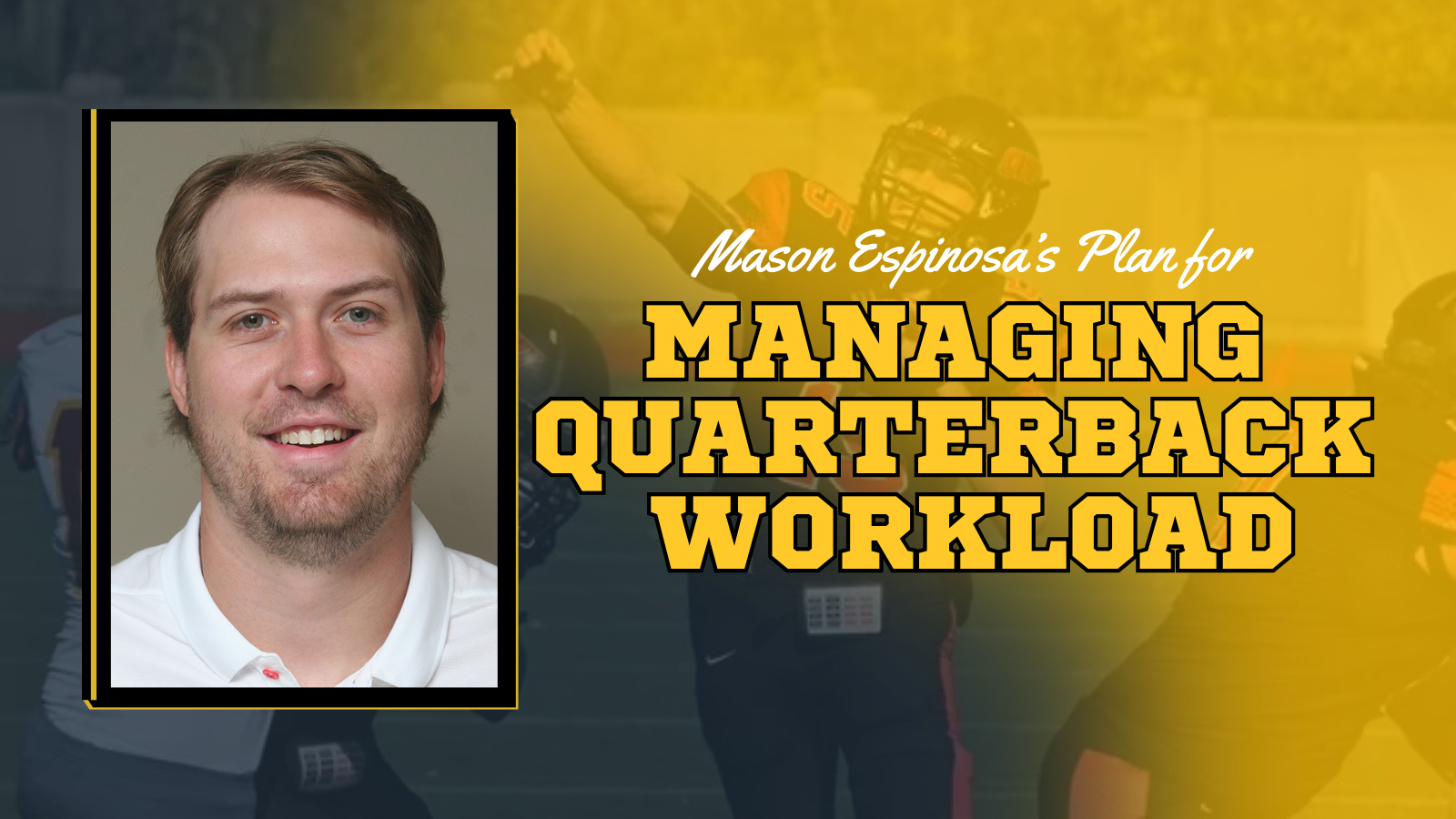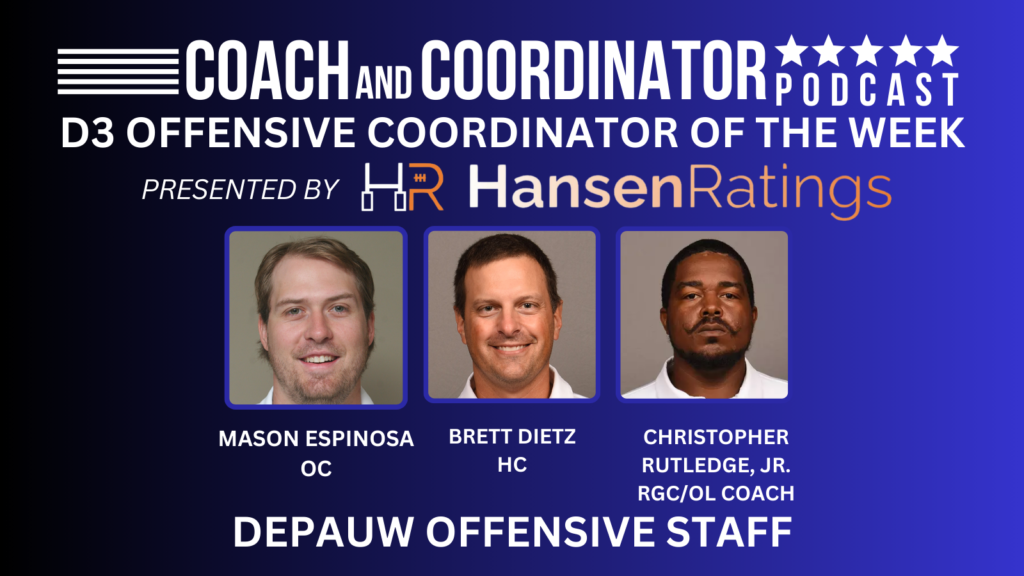
Mason Espinosa on Keeping Your Quarterback Fresh for Peak Performance
Quarterbacks drive the offense, and their performance often determines a game’s outcome. With this key role comes a significant workload—both mentally and physically. Effectively managing a quarterback’s workload is essential to keeping them healthy, maximizing efficiency, and ensuring they’re ready to perform at their best when the pressure is on.
Here’s how to keep your QB fresh throughout the season, based on insights from Mason Espinosa, Offensive Coordinator at DePauw University.
Early Season: Establishing Offensive Identity
During training camp and the early weeks of the season, quarterbacks need to throw frequently to establish the team’s offensive identity. This is when coaches work to identify what fits their personnel and solidify core concepts. It’s a period where volume matters—repetitions are key to discovering strengths.
- Arm Care Awareness: “Receivers’ legs regenerate, but arms don’t. Once you have a dead arm, you’ve got to shut it down for a while,” says Coach Espinosa. He emphasizes early-season prevention, making sure QBs ice, stretch, and care for their arms even when they don’t feel sore.
Mid-Season Adjustments: Shift to Mental Reps
As the season progresses, teams should decrease the physical workload and increase mental reps. This shift reduces the strain on the quarterback’s arm while sharpening decision-making skills and reinforcing game context.
- Dry Mental Reps: Espinosa’s approach focuses on simulating plays without a full physical effort. “I want you to get a rep of reading the defense without actually putting that rep live on your arm,” he explains. This allows quarterbacks to practice reads and timing without the wear and tear.
- Visualization and Walkthroughs: Emphasizing dry reps and visualization helps QBs mentally engage without excessive throws, reinforcing the mental side of preparation.
Strategic Reps: Prioritizing Key Concepts
In the heart of the season, teams must focus on refining the core concepts that define their offense. It’s not about maximizing reps but ensuring that every rep is high quality and purposeful.
- Quality Over Quantity: “Reps are at a premium,” says Espinosa. “If you’re not getting your work done in 12 to 13 plays, then you probably have too much in your game plan.” He limits team periods to short sets, ensuring every repetition has meaning.
- Situational Context: Instead of running isolated drills, Espinosa advocates for situational practice. “Football is won situationally,” he notes, stressing the importance of practicing within the game’s context rather than in a vacuum.
Late Season Tapering: Balancing Rest and Readiness
As the season nears its climax, tapering becomes a focus. It’s about finding the balance between staying sharp and reducing physical strain. The goal is to enter game day fresh and prepared with a live arm.
- Front-Loading Practices: Espinosa prefers loading higher-rep periods earlier in the week to give QBs and receivers more time to recover. “It’s about getting the reps in early so you’re not burning them out 48 hours before game day,” he says.
- Controlled Practice Periods: By keeping team periods concise, Espinosa ensures the team’s core plays remain sharp without overuse. He suggests limiting periods to 12 plays, keeping the workload manageable while maintaining focus.
Managing Receiver Workload to Support the QB
Managing a quarterback’s workload requires considering the receivers as well. Every passing rep impacts both positions, so it’s essential to find creative ways to keep everyone fresh.
- Mixing Up Routes: Espinosa adapts practice with half-speed routes or mental reps, allowing quarterbacks and receivers to simulate situations without full-speed effort. This approach balances the needs of both positions and keeps everyone healthier for game day.
Master the Balance
Managing a quarterback’s workload is about awareness, smart adaptation, and strategic execution. Coaches who master this balance use mental reps to sharpen decision-making, reduce physical strain, and maintain high-level performance throughout the season. Espinosa’s insights emphasize a calculated approach to workload, ensuring that QBs remain fresh and ready for game day.
By implementing these strategies, you can maintain a healthy and effective quarterback, giving them the edge when the pressure is highest.
D3 Offensive Coordinator of the Week
Mason Espinosa is recognized as the Coach and Coordinator D3 Offensive Coordinator of the Week presented by Hansen Ratings in their 53-34 win over Denison Univeristy on October 19, 2024. Brett Dietz is the Head Coach at Depauw and Christopher Rutledge, Jr. is the Run Game Coordinator and Offensive Line Coach.
Notable Stats
Mason Espinosa | DePauw | 53-34 vs. Denison
- Over 250 yards passing and over 200 yards rushing
- Scored on first seven drives
- This is the fifth game this season with at least 50 points
- 67% on third downs (only nine 3rd downs the entire game)



